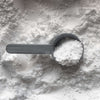The Only Guide You Need to The Most Popular Types of Protein Powder in 2024

With so many types of protein powder available in the market these days, it’s easy to get overwhelmed. But don’t worry - we’ve got you covered. The following guide will go over some of the most popular types of protein powder:
ANIMAL-BASED PROTEIN:
- Whey Protein (Concentrate, Isolate, Hydrolysate)
- Casein Protein
- Egg Protein
- Collagen Protein
PLANT-BASED PROTEIN:
- Soy Protein
- Pea Protein
- Rice Protein
- Hemp Protein
Animal-Based Protein
Whey Protein
Whey protein is the most common kind of milk-based protein powder. Due to its inclusion of all nine essential amino acids, it is referred to as a "complete protein". Whey protein is a wonderful option for post-workout recovery because it is rapidly and easily absorbed by the body. Additionally, it comes in a variety of forms, including whey protein isolate, whey protein concentrate, and hydrolyzed whey protein.
Concentrate
Protein powder made from milk is called whey protein concentrate (WPC). It is produced when the liquid whey is separated from the solid curds during the process of making cheese. WPC is a "complete protein," which means that it has every necessary amino acid that our bodies need. The protein in WPC can range in concentration, but it typically falls between 30%-90%. More lactose and fat will be present if the concentration percentage is on the lower spectrum.
Because WPC digests rather quickly, it is thought to be a suitable choice for post-workout recovery. Additionally, it is a reasonably priced and widely accessible type of protein powder.
Isolate
Compared to whey protein concentrate, whey protein isolate (WPI) is a more highly purified form of whey protein powder (WPC). Most of the lactose, fat, and other non-protein components are removed from WPC before it is further processed to create WPI. As a result, WPI typically yields 90% or more protein in each serving.
WPI is an even faster-digesting protein and is also a good choice for those who are lactose intolerant or have milk allergies. Due to the additional processing necessary to eliminate the non-protein components, WPI is also a little more expensive than other whey protein sources.
Hydrolysate
Hydrolysate protein powder (aka. hydrolyzed protein powder) is a form of protein powder that has been partially broken down (hydrolyzed) into smaller peptides. In comparison to other forms of protein powder, this technique allows hydrolyzed protein to be the most rapidly and easily absorbed by the body.
Pre-digesting the protein and dissolving it into smaller peptides during hydrolysis allows the body to absorb and utilise it more quickly. For those who have a hard time digesting other types of protein, this also makes it easier on the stomach.
Due to the additional processing needed, hydrolysate protein powder is often more expensive. It is frequently applied to patients with particular dietary requirements, such as those who have digestive problems, in medical and clinical settings.
Casein Protein
Casein protein, which is also derived from milk, is a slow-digesting protein (takes longer for the body to break down and absorb) that can help muscles repair when they go for extended periods of time without meals (i.e., during sleep). It is a complete protein as well.
Typically, casein protein powder is created by separating milk's casein from its whey protein. The final powder typically contains 80% protein and 20% carbs, fat, and lactose.
Casein protein has the advantage of forming a gel-like structure in the stomach, which can aid in slowing down the digestive process. This may prolong your feeling of fullness and regulate your blood sugar levels.
In addition to having an abundance of vital amino acids, casein protein powder is also high in glutamine, an amino acid that has been demonstrated to enhance immune system health and speed up muscle repair.
Like whey protein, casein protein powder can be found in different forms, such as micellar casein, which is considered the purest form of casein protein and is known for its slow-digesting properties.
Egg Protein
Egg protein, which is derived from egg whites, is a complete protein that has all nine essential amino acids. The egg whites and yolks are separated then dehydrated to make a powder. When the fat and cholesterol in the yolks are removed through this process, the final product is a lean source of easily digestible egg protein powder.
As a complete protein, egg protein powder has all of the important amino acids that our bodies need. Additionally, it is a good source of vitamins and minerals (i.e., riboflavin, selenium, vitamin B12, etc.).
Because egg protein powder is a good source of high-quality protein and can help with muscle recovery and growth, it is a popular choice among athletes and bodybuilders. However, it’s important to note that egg protein powder is not suitable for vegans or those with egg allergies, and can contain traces of salmonella if not properly processed.
Collagen Protein
Collagen is the most abundant protein in the body, making up around 30% of the total protein content, and is found in the skin, bones, tendons, ligaments and cartilage of animals. The collagen in the hides, bones, and connective tissues of cows, chickens, fish, and other animals are extracted to make collagen protein powder. Both skin and joint health benefit from its use.
Glycine, proline, and hydroxyproline are three essential amino acids that are particularly abundant in collagen protein powder and are crucial for maintaining healthy skin, hair, nails, joints, and bones. Additionally, it is good for the gut lining and could enhance the condition of the digestive system.
Typically flavourless, collagen protein powder is convenient to include into smoothies, coffee, tea, and other foods and beverages. However, many in the market today are also flavored to appeal to more people.
It's important to note that collagen lacks some of the necessary amino acids, so it is not a complete protein. Therefore, it shouldn't be the primary source of protein in a diet, although it can be a beneficial supplement.
Plant-Based Protein
Plant-based protein powder is derived from plants and a common alternative to animal-based protein powders for vegetarians, vegans, and those looking to reduce consumption of animal products. Plant-based protein powders are also a great source of essential amino acids needed for muscle recovery and growth, and can be a good option for post-workout recovery. They are also often rich in other beneficial nutrients such as fiber, vitamins and minerals.
While plant-based protein powders might be an excellent source of nourishment, it's crucial to remember that they may not have as much protein content as protein powders derived from animals. They also tend to have a more “chalky” taste and texture compared to whey-based protein shakes.
Randomly, plant-based protein powders have been praised for being much more compatible and successful in recipes (due to their structures) compared to whey-based protein - a quick tip for those who like to create high-protein food recipes! For more tips and tricks on protein recipes, check out our post on The Most Useful Tips and Tricks for Making Recipes with Protein Powder (That You Wish You Knew Earlier).
Soy Protein
Soy protein, a plant-based protein derived from soybeans, is a complete protein that includes all nine essential amino acids. It is a good source of antioxidants, vitamins, and minerals (i.e., iron, zinc, vitamin B12). Other well-known health advantages of soy protein powder include lowering cholesterol, regulating blood sugar, and reducing the risk of heart disease.
However, because soy products include isoflavones, a class of phytoestrogen that can mimic the actions of oestrogen in the body, it can be considered a controversial food product. According to several research, taking large levels of soy isoflavones may be harmful to one's health, especially in those who have hormonally sensitive disorders. However, some research have revealed that consuming soy products in moderation does not significantly harm your health and might even improve it. As a result, the data is not definitive, and it is always recommended to speak with a healthcare professional before making any significant dietary changes.
Regardless, for vegetarians, vegans, and those with milk or egg allergies or sensitivities, soy protein powder is still a popular option. It is also regarded as a decent substitute for those who are lactose intolerant. Soy protein is also a great alternative to other plant-based protein choices, as it generally has a milder taste.
Pea Protein
Peas are the source of pea protein, a plant-based protein that is obtained by eliminating the starch and fibre to reveal only the protein. All nine of the essential amino acids—which are crucial for muscle growth and recovery—are included in this complete protein.
There are an abundance of vitamins and minerals in pea protein powder (i.e., iron, phosphorous, etc.). It is a good source of phytochemicals and antioxidants as well, which can enhance general health and wellbeing. In addition, pea protein powder is proven to enhance muscle mass, lower blood pressure, and regulate blood sugar levels.
Pea protein is a good option for vegetarians, vegans, and those with allergies or sensitivities to milk, eggs, or soy. It is also easily digestible and a suitable choice for those who have digestive problems.
Rice Protein
Rice protein, a plant-based protein derived from brown rice. It is rich in vitamins and minerals (i.e., iron, potassium, etc.) and a good source of antioxidants and phytochemicals as well. It is also easy to digest and can be a good choice for those with gastrointestinal issues or lactose intolerance. It is a great alternative for those with allergies or sensitivities to milk, eggs, soy, and pea.
Although it is not a complete protein, it has a decent supply of crucial amino acids (i.e., lysine, arginine, leucine) important for muscle growth and recovery. Other benefits of rice protein powder include promoting overall health and well-being, lowering blood pressure, and regulating blood sugar levels.
Hemp Protein
Hemp seeds are the source of hemp protein, a plant-based protein. The hemp seed's outer shell is removed to reveal the inside kernel, which is then ground into a fine powder to create the product. With a protein level of about 25%, this powder is high in protein and an excellent source of essential amino acids (although it is not a complete protein).
Omega-3 and omega-6 essential fatty acids, which are important for overall health and wellbeing, are abundant in hemp protein powder. Hemp protein also provides additional health advantages comparable to those of rice protein powder. It is also a good source of fibre, vitamins, and minerals such as potassium, zinc, and iron.
Disclaimer
It's essential to remember that the source and processing techniques utilised can affect the protein powder's quality and nutritional content. Additionally, before using any new supplement, it's crucial to review the ingredient list and speak with a healthcare practitioner because some people may have allergies or sensitivities to particular kinds of protein powder.
If you don’t have any specific allergies, sensitivities, or intolerances, we would recommend giving different types of protein powder a try to see which one is your favorite!
-
Posted in
animal-based, blog, casein, collagen, concentrate, hemp, hydrolysate, isolate, pea, plant-based, protein, protein powder, rice, soy, types, vegan, whey, wpc, wph, wpi








